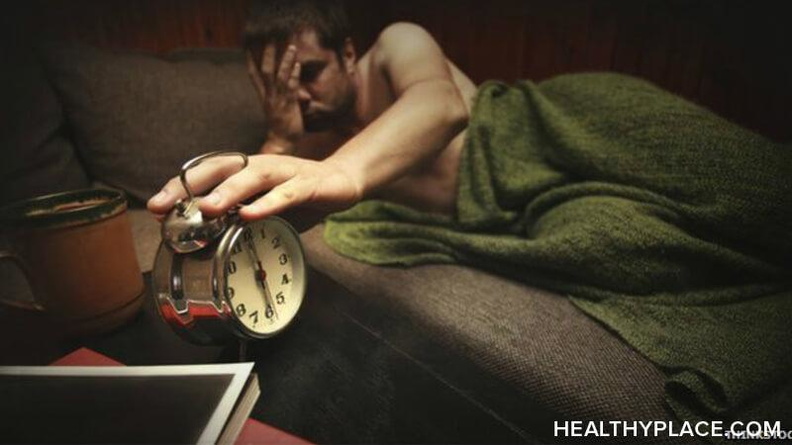Fatigue and PTSD -- Why Am I So Tired?

I don't know how many times I have asked myself about fatigue and posttraumatic stress disorder (PTSD) since being diagnosed. There are times I feel extremely exhausted when I haven't done anything to cause it. Naps during the day have gone from being a luxury to being a necessity at times. Feeling this way isn't unusual for someone with PTSD; there are both psychological and physical factors that cause us to feel so tired. Fortunately, I have found some things that help me to deal with the PTSD and fatigue and still be productive.
Psychological Factors of PTSD that Make You Tired
There is no doubt that there is a mind and body connection in everyone; stress can make us sick, and conversely, a physical illness can cause us to be anxious or depressed. For people who have PTSD, it's no different. In fact, the mind and body connection is often more prominent in people with PTSD or other mental illnesses. Some of the psychological factors of PTSD that can cause us to be exhausted are:
- Stress--when anyone gets stressed it's likely to cause them to feel tired. When someone who has PTSD gets stressed, it can make him or her feel exhausted.
- Depression--one of the symptoms of PTSD is depression, and when you're feeling down it is likely to make you tired and want to sleep.
- Hypervigilance--feeling like you are constantly on alert, waiting for something bad to happen, takes a toll. That feeling of always being "on" is enough to make anyone with PTSD tired.
- Acting like everything is okay--often times, those of us with PTSD don't want to let others know that we are suffering. Acting as if everything is alright when it's not, is draining.
- Being triggered--when something triggers our PTSD symptoms to flare up, and fight, flight, or freeze kicks in, we can definitely feel worn out when the crisis is over.
Physical Factors of PTSD that Make You Fatigued
 There are also some physical factors at play when PTSD causes fatigue. They may be brought on by psychological factors, or vice versa. There's that mind and body connection again (How to Cope With Body Memories in PTSD Recovery). Here is what may be happening physically that is exhausting:
There are also some physical factors at play when PTSD causes fatigue. They may be brought on by psychological factors, or vice versa. There's that mind and body connection again (How to Cope With Body Memories in PTSD Recovery). Here is what may be happening physically that is exhausting:
- Hormones--the stress hormone cortisol is released during trauma. It desensitizes us so that we feel less pain, and it gives us a boost of energy. In people who have PTSD, cortisol is produced in higher levels and for a prolonged period of time, which can cause fatigue, as well as memory loss and decreased serotonin levels.
- Adrenal system--cortisol and other stress hormones are produced by the adrenal system. When there is an overload on the adrenal system, people with PTSD are likely to experience fatigue, exhaustion, and increased stress.
What to Do When PTSD Causes Fatigue
If you find that you are feeling exceptionally tired, try some of the following and see if they help. These are some of the things that work for me:
- Reduce stress--you can work on this proactively by using mindfulness, meditation, prayer, writing, talking about the things that are stressful to you, exercise, or anything that helps you keep your stress level down.
- Recognize limits--I admit this one is hard for me. I always think that I can do more than I can. Recognizing when you are reaching your limit of productivity, interaction, or stress, and then stopping to rest and reset, is very helpful in keeping fatigue and exhaustion at bay.
- Prioritize tasks--when you are getting close to reaching your stress limit, you need to prioritize what you have to do versus what you think you should do. For me that means that it's okay for laundry or dirty dishes to wait when I am tired.
- Schedule downtime--this is another proactive thing you can do to keep your stress level down and help you feel more active. Try to set aside time to relax or nap, just like you set aside time for an appointment or task.
- Talk to your doctor--if insomnia is a problem for you, it's important to talk to your doctor to see if there is an appropriate medication for you to help you get a good night's sleep.
Fatigue may always be a part of your PTSD symptoms, but it can be managed when you find the things that work for you. I would love to hear other ways to avoid fatigue and exhaustion in PTSD; please share your strategies in the comments below.
Find Jami on Facebook, on Twitter, on Google+, and on her blog, Sober Grace.
APA Reference
DeLoe, J.
(2016, September 15). Fatigue and PTSD -- Why Am I So Tired?, HealthyPlace. Retrieved
on 2026, March 2 from https://www.healthyplace.com/blogs/traumaptsdblog/2016/09/fatigue-and-ptsd-why-am-i-so-tired
Author: Jami DeLoe
Hello, I was diagnosed with PTSD four years ago, I had a childhood trauma and was physically and verbally abused growing up. I was also sexually molested for many years. I have observed that I easily got exhausted and cannot get back up again, my job, decision-making, and everything are so messed up. I am seeing a counselor unfortunately I feel like it makes me worse because she kept asking about what happened, the ore I remember things the more I get worse. I am looking for some help in regards to being normal again and to think logically. Thank you!
Hi there! I'm so sorry you had to endure abuse growing up. No one deserves that. Exhaustion from PTSD can be debilitating, and sometimes, it feels like things get worse before they get better. I'm glad you're seeing a professional, but if you feel you need some more resources, please refer to our Resources and Hotlines page: https://www.healthyplace.com/other-info/resources/mental-health-hotline-numbers-and-refer….
Know you are not alone in this.
Hello, I am 61, and have felt like something is wrong with me. My parents didn’t show me affection ever, so In my mind I felt unloved and found myself pregnant at 15 I thought he paid attention to me must love me. He mentally and physically abused me kidnapped me when I tried to get away with my baby.. I finally turned myself in as a runaway with two children. He messed me up bad. I was married to a man for 31 years. The last 10 years was not good because he didn’t want affection anymore and I ended up, like I did as a child in my bedroom all the time. Thinking something is wrong with me. I left him because I felt I had to save myself. I lost my first born 8 years ago suddenly. I don’t think I have grieved yet. I’m scared of letting go of what feelings will come out. I might not make it back. My Father passed a couple months ago. I wish I had a good relationship with him, but I have always felt uncomfortable around him. My primary doctor said she agrees that I have PTSD and Trauma , I am going to go get properly diagnosed for the way I feel, a loneliness inside all the time. I pray that God Leeds me. I have so much to say, but I will go now. I hope everyone who is suffering to find help🙏 . Teresa
My daughter has COMPLEX -PTSD, she is 44 , she has had COMPLEX- PTSD since she was 28. She is also highly Intuitive and an empath. She often gets very tired after a stressful event or stressful events. I am helping, she lives with me, I am 74. Any helpful tips would be appreciated, She has seen a Psychiatrist. You can reach me at my email. Thanks
Exercise is so hard for me. Because how fatigue I get… which has made weight gain for me. And added to depression… any tips or advice in how to workout with PTSD?
Thank you for this summary. Fatigue is maybe my biggest enemy. I used to be an incredible productive person, and now after 1 day of productivity, just when I think I'm finally making some strides, the next day all i can do is lay in bed and watch TV. I'm looking for ways to get my productivity back...
This makes me feel better. Maybe I need to just cut myself a break and what I get done for the day, let it be enough
I know about this. I go through this everyday. I was diagnosed with PTSD just this year. I was sexually assaulted in 1996, when I was 19. During that time I developed anxiety issues that triggered hypervigelence. This constant worrying and hyerarousal and fear put me in a fatigue tail spin.
I found that yes meditation, walking, and NLP (Neuro Lingustic Programming) helped me keep worried thoughts out of my head.
I have flashbacks, of events. They cause me alot of worrying, sadness.
Thanks for talking about being tired from PTSD. I also found insomnia typically associated with PTSD doesn't help create good enery on top of it. Thanks for your wonderful blog.
Hi Sober, you summed the topic amazingly! Fatigue is often the reason people cannot achieve a good amount of productivity and can also disturb their daily life responsibilities.

